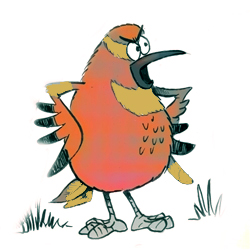It’s an age-old problem and one often asked of anyone who is known to have an interest in birds whether a full-on ornithologist or a humble birder. People often find young birds away from their nests during spring and summer. But how can you help them?
People are good natured and fear that the bird will suffer and or get eaten by their cat or a passing bird of prey. During late spring rescue centres often find well-meaning people turning up with a young bird they thought needed help and the truth is most of them should have been left alone or, perhaps, moved from immediate danger.
The first thing these good Samaritans need to learn is the difference between a fledgling and a nestling. Fledglings will be almost fully feathered, nestlings will be mostly featherless. In the former the best action is no action. In the latter case returning the chick to its nest is the only action likely to make a difference to its survival.
The thing is that wandering from the nest is exactly what young birds do that are just learning to fly. It’s normal for fledgling chicks to be away from the nest and, far from being abandoned, the parent bird is probably close by keeping an eye of the chicks leaving the nest.
Of course, there are times when that they could be in danger or are sick or injured and so in need of assistance. It should be obvious that the bird is injured or ill and the best action then is to put the birds where it is relatively safe from predators. But the majority of the time they are best left alone. Sick birds will either recover or not and human intervention is unlikely to make a difference. Older, injured birds taken into care are more likely to respond to treatment.
So, in the case of nestlings Help look for its nest in the close by trees or bushes. If you spot it, pop the chick back and the parents will look after it. (By the way don’t worry that you picked it up, it’s a myth that baby birds touched by humans will be rejected by its parents, they won’t abandon a chick you return to its nest.)
If you think you’ve found a sick or wounded fledgling or nestling, you can take the baby into care by using a cardboard box with air holes and put a tea towel in the bottom so it can keep warm but don’t try and feed the baby.
If the injury is no significant the bird may well recover and you can put it back in the nearest bush to where you found it.
Its part of nature that most species breed more offspring than can hope to survive into adulthood. Some will succumb to predators, disease or injury. It’s just the way things are. The best we can do is ensure that mother nature has plenty of the world to itself free from human pollution and disturbance so she can thrive.
